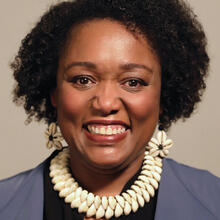There is widespread confusion when it comes to understanding the morality of Covid-19 vaccines and how we are to live together. Many of us want to do good and avoid evil. We want to love our neighbor as ourselves. But some of the talk in the United States has not focused on the good we can do for our neighbors and ourselves as much as on the preservation of our putative freedom as Americans.
The litany of American freedoms emphasized during the pandemic goes like this: We must have freedom from wearing masks, freedom from social distancing, freedom from getting vaccinated, freedom from quarantines and freedom from lockdowns. Freedom for the strong and healthy to live unencumbered by concern for the weakest and most exposed among us. The latest iteration of this freedom frenzy is an insistence on exemptions from vaccine mandates on religious grounds.
We should remember that freedom means the ability to do what is good, which may not always coincide with what we want.
Let’s take a closer look at one attitude I’ve heard: “Lock down those people (the elderly, the immunocompromised), but let the rest of us live as if there is no pandemic.” This view does not account for those living in multigenerational households with the elderly nor for those who live with the most vulnerable. It is centered on the strongest people living as they wish and without solidarity with the remainder of the human family. While we want to live as we did before the pandemic—and I understand that desire—we must reject detachment from human fraternity and familial relations and resist the siren song of a freedom that is in reality misguided individualism.
We should remember that freedom means the ability to do what is good, which may not always coincide with what we want. Is the desire to live as we did before the pandemic a bad one? No. What is not good is using that desire to rationalize the refusal to undertake means that will keep us from transmitting the virus to our neighbors, particularly the most exposed, the weakest and the vulnerable.
We Catholics cannot divorce ourselves from our neighbors. We must do what we can to safeguard our health and the health of our neighbors in this pandemic. The church is concerned not only with our spiritual health but also with our physical health. We should not be surprised by this. After all, we are called to carry out both spiritual and corporal works of mercy, to care for our bodies and souls.
As Catholics, we should emphasize the principle of “what more I can do” rather than “how little I can do.”
On this week’s episode of “The Gloria Purvis Podcast,” I talk in depth with Sam Sawyer, S.J., about what more we can do during the pandemic for ourselves and our neighbors in light of our Catholic moral tradition. He sheds light on what has been clouded by the culture wars. Yes, there is a legitimate concern about vaccines derived from or tested with cells from aborted fetuses. Yes, religious exemptions from state imposed mandates should be respected. But these focus on a very narrow slice of Catholic moral analysis and ultimately misrepresent the church’s official position: that taking a vaccine is morally acceptable and an act of love for our neighbor and the common good.
Father Sawyer and I discuss why leading the conversation with the principle of the common good is more reflective of the church’s position on these vaccines. We can avoid cultivating an unhealthy self-centeredness in dealing with the pandemic by having an outward focus on the community. We can also acknowledge people’s legitimate concerns about abortion in a way that is truly Catholic. We only need to follow our Catholic moral tradition to determine what actions are morally acceptable and at the same time consider what to do for the common good.
As Catholics, we should emphasize the principle of “what more I can do” rather than “how little I can do.” The bottom line is this: It is morally acceptable to get these vaccines. They are not perfect. If a person decides not to get vaccinated for reasons of conscience, that person must consider what else they can do and behave in ways that show care and concern for their neighbor. That means wearing masks, socially distancing and quarantining or locking down if necessary. True freedom is the ability to do what is good, not only for you, but for everyone.








